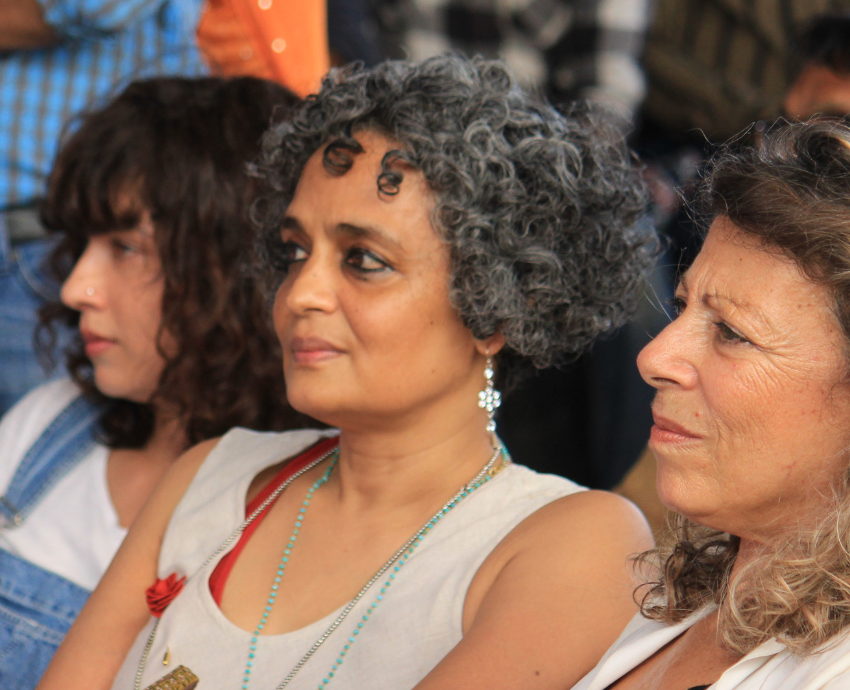
Indian Prime Minister Narendra Modi and his Bharatiya Janata Party (BJP) suffered a devastating win in early June when his far-right Hindu nationalist party won a majority of votes in the national election, but not the majority of seats.
The BJP’s drop from 303 seats in 2019 to a mere 240 means it can only retain its rule by forming a coalition with the National Democratic Alliance, which does not have the same authoritarian tendencies.
Also in mid-June, Delhi BJP official VK Saxena announced he had given the greenlight to prosecute Modi critic, award-winning writer and dissident Arundhati Roy.
Roy is a prolific writer of polemical political treatises. In 1997, she won the Booker Prize for her God of Small Things.
Modi wants her arrested for comments she made during a 2010 public forum on Kashmir, under the countries’ notorious anti-terror law, alongside Professor Sheikh Showkat Hussain.
Roy and Hussain have been threatened with prosecution under the 1960s rights infringing Unlawful Activities (Prevention) Act (UAPA), which had barely been used until Modi and the BJP started applying it to old rivals and loud critics over the past 10 years.
Modi became PM in 2014 after he had been BJP chief minister in Gujarat state since 2001. During the 2002 Gujarat riots, deadly pogroms against Muslim communities, he became known as a brutal ruler.
Roy shifted to political prose, with a poetic flair, in 1998, with her The End of Imagination essay — a statement against India and Pakistan acquiring nuclear weapons. Since the 1947’s partition, both countries are still at loggerheads, with Kashmir the flashpoint.
Being prosecuted under these old laws is serious, regardless of any resulting conviction, because it is extremely hard to access bail and cases can take years to build. Suspects can spend 5 to 10 years on remand, only to be released on acquittal.
A voice of defiance
After speaking out against Indian governments’ hawkish politics from the mid-90s, Roy turned her attention to the government drive to construct big dams and, in particular, the Narmada Dam.
The dam construction displaced thousands of tribal Adivasi people.
Roy has spent the last 30 years lending her voice to the voiceless.
She spoke out against United States imperialism under President George Bush in the early 2000s, as well as Modi’s attempt to shift secular India into a xenophobic nation, run by Hindu nationalists.
“Look, Kashmir has never been an integral part of India,” said Roy 14 years ago. Even though Roy was speaking about commonly held views, she is being threatened with prosecution.
“However aggressively and however often you want to ask me that, even the Indian government has accepted in the United Nations that it’s not an integral part of India,” Roy said during the 2010 conference on Kashmir. “So, why are we trying to change that narrative now?”
In the wake of that forum, in October, a group of BJP women’s organisation members gathered at Roy’s house and called on her to give up her country because of her views.
This was despite her long being known to support Kashmir.
Talk of prosecuting Roy began then.
Azadi rising
As the colonising British left the subcontinent in tatters in the mid-1940s, the Kashmiri Hindu Maharaja Hari Singh of the Muslim majority region threw in his lot with India rather than the newly-forming majority Muslim Pakistan.
The Kashmiri struggle is much greater than this one act: it’s a story of a people trapped between rival nations, seeking self-determination.
A February 2019 suicide attack in Kashmir in which some 40 Indian soldiers were killed just before a national election, prompted Modi to act with vengeance.
Riding on the shock waves, he was re-elected in 2019.
He then proceeded to strip the region of its Article 370 special autonomy rights and used the COVID-19 pandemic to send in the military to repress Kashmiris. This has included internet blackouts, lockdowns and media suppression.
Roy continued to speak out against Modi during his second term of office, including his intensified crackdown on Kashmir. She has also condemned the BJP’s citizenship laws that specifically exclude Muslim people and Islamophobic attacks that have been rising with impunity.
Modi’s attempt to silence Roy is a last-ditch effort against the struggle for azadi or freedom.
Roy has become a symbol of a multicultural, multi-faith secular democratic India that continues to oppose the rise in Hindu nationalism.
This month’s election result shows that after a decade of Modi’s right-wing nationalistic repression, it is in decline, perhaps on its way to toppling over.